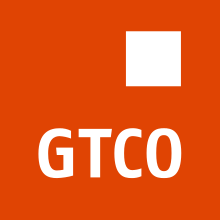 | |
| Company type | Public limited company |
|---|---|
| LSE: GRTB | |
| ISIN | 0478224264 |
| Industry | Finance |
| Founded | 17 January 1990 |
| Headquarters | 635 Akin Adesola Street, Victoria Island, Lagos, Nigeria |
Area served | Cote d'Ivoire, Kenya, Liberia, Gambia, Ghana, Nigeria, Rwanda, Tanzania, Uganda, United Kingdom |
Key people | Hezekiah Oyinlola, (Chairman) Segun Agbaje, (Group CEO) |
| Products | Retail banking Commercial banking Corporate banking |
| Services | Banking, Payments, pension management, asset management |
| Revenue | |
| Total assets | |
| Total equity | |
Number of employees | 3387 (2023) [1] |
| Website | www |
Guaranty Trust Holding Company PLC also known as GTCO PLC is a multinational financial services group, that offers retail and investment banking, pension management, asset management and payments services, headquartered in Victoria Island, Lagos, Nigeria. GTCO Plc was created in July 2021 following the corporate reorganization of Guaranty Trust Bank PLC (or GTBank) into a Holding Company.[2]
GTCO Plc's reorganisation means it will now offer more services beyond banking; with a payments business being top of mind for the group.[3] Under its old structure, it could not have run non-lending businesses because a 2010 regulation[4] by the Central Bank of Nigeria (CBN) mandated banks to stop operating their non-banking subsidiaries. They either had to divest from non-core lending service or restructure as a holdings company.
Its new businesses include payments, pension management, asset management, and its existing banking business. GTCO's banking subsidiary in Nigeria, Guaranty Trust Bank Limited is Nigeria’s most valuable bank by market value with its most recent market valuation [5] at N840.26 billion.
Guaranty Trust Holding Plc original started as Guaranty Trust Banks, and it was founded in 1988 by over 35 young Nigerians in their thirties, spearheaded mostly by Tayo Aderinokun and Fola Adeola, but also included Femi Pedro, Gbolade Osibodu, Femi Akingbe, Akin Opeodu, and others.[6]
- ^ a b c d e f "Annual Reports".
- ^ "Guaranty Trust Holding Company Completes Corporate Re-organization".
- ^ "One of Nigeria's biggest banks, GTBank is restructuring to take on the fintech industry | TechCabal". 26 March 2020.
- ^ "Archived copy" (PDF). Archived from the original (PDF) on 12 February 2022. Retrieved 13 August 2021.
{{cite web}}: CS1 maint: archived copy as title (link) - ^ "Top 7 banks in Nigeria by market valuation - Nairametrics". 26 June 2021.
- ^ "THEY DARED, THEY DID: THE STORY OF YOUNGSTERS THAT FOUNDED GTB". JarusHub - Nigeria's No. 1 Career Website. 10 October 2016. Retrieved 18 January 2018.